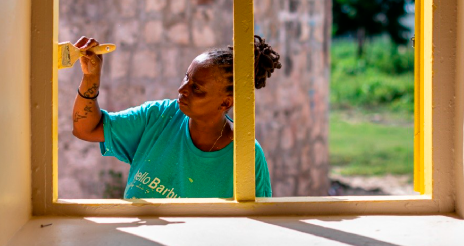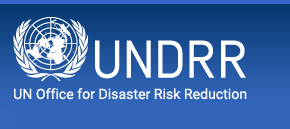- Our Mandate
- Mission and Objectives
- UNDRR in the UN
- Work Programme & Annual Reports
- Results Based System
- Work Partnerships
- Headquarters - Geneva
- SG-UN representatives for DRR
- Regional Office – The Americas and the Caribbean
- Head of the Regional Office – The Americas and the Caribbean
- What is Disaster Risk Reduction?
- What is the International Strategy?
- History of UNDRR
Caribbean needs to better warn and insulate women against disaster risk
 Photo description: Women in the Caribbean. Photo credits: UNDRR
Photo description: Women in the Caribbean. Photo credits: UNDRR
By: Sophie Hares, UNDRR – Regional Office for the Americas and the Caribbean.
PANAMA CITY, Panama, 9 March, 2020 - Alert systems designed to warn Caribbean communities of approaching hazards should be better tailored to reach women who are most likely to be impacted, said delegates at last December's Comprehensive Disasters Management conference held in Saint Maarten.
In St. Lucia, factoring gender into early warning systems (EWS) was key, given poor, women-headed households were more likely to be living in inadequate and vulnerable homes, said Andrew George, programme development officer at the country's National Disaster Office.
"When a disaster strikes, those kinds of families are much more susceptible to the shocks and effects, they're not able to relocate," said Salim October, senior response officer at Guyana's Civil Defence Commission, at the conference in St. Maarten.
Ensuring women were reached by EWS is essential to reducing casualties, given they are more likely than men to die in disasters. For example, four times as many women than men were killed in Indonesia, Sri Lanka, and India during the 2004 tsunami, because men were taught how to swim and climb trees at young ages, while women were not, as shown on a study done by Oxfam.
While higher poverty levels play a major role in the vulnerability of women, who are often responsible for children and elderly family members, data showed that better equipping them to deal with disasters is vital to boosting individual and community resilience.
Given many of St Lucia's volunteer rescuers were women, more also needed to be done to ensure their properties were insured in case of damage during an event, he said. "We want to make sure that their homes and their families are protected, so if they have to go out and volunteer, at least they have their homes insured and anyone who depends on them protected," said Mr. George.
Supported by the United Nations Office for Disaster Risk Reduction, trial projects are already underway in the region to ensure EWS are better targeted towards the different needs of women and more vulnerable groups.
In addition, shock-responsive social protection measures such as channeling emergency cash to women after a disaster were proving effective, but more preparation was needed to ensure those most at risk were properly registered, said experts.
Petrona Davies, British Virgin Island's permanent secretary for health, said that after Hurricanes Irma and Maria smashed their way across the Caribbean, around 68 percent of emergency cash transfers were distributed to women-headed households.
This due to the vulnerability of women on disasters aftermath. According to United Nations data, when 90% of the houses were destroyed in Grenada due to Hurricane Ivan (2004), most domestic workers, the majority of whom were women, lost their jobs.
A greater focus on inclusion is also key to helping Caribbean countries meet the targets of the Sendai Framework for Disaster Risk Reduction which include increasing availability and access to multi-hazard early warning systems and cutting the number of people affected by disasters.
"With effective early warning systems, the Caribbean is going to be ready to cope with multi-hazardous events. I believe the Caribbean is going to be ready for the next big one," said Noel Sampson, from the European Commission Humanitarian Aid Office's regional unit.
Related links
https://www.undrr.org/publication/sendai-framework-disaster-risk-reduction-2015-2030
https://dpi.gov.gy/tag/civil-defence-commission/
http://www.bvi.gov.vg/content/ministry-health-and-social-development
Follow the UNDRR news online :
 Now we have twitter account @UNDRR Américas y el Caribe
Now we have twitter account @UNDRR Américas y el Caribe
JOIN US!
Tweets por el @UNDRR Américas y el Caribe
